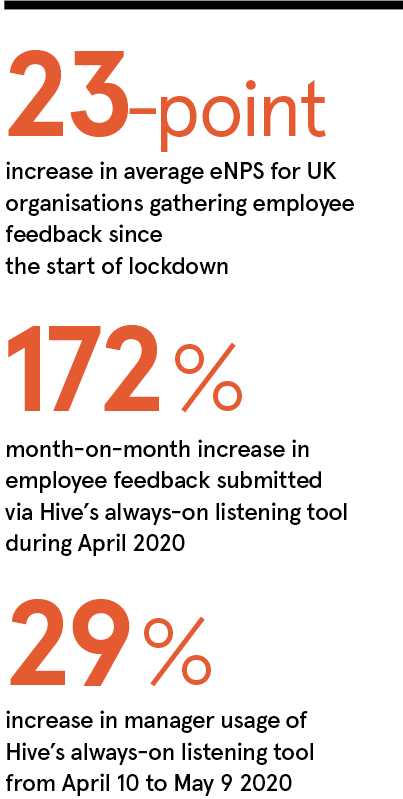As we begin to see glimmers of hope, managing change amid the coronavirus crisis is increasingly important as organisations start to transition to a new normal of office-based, remote or flexible working.
“As any leader will know, it’s not as easy as bringing people straight back to work. You have to take a lot of things into consideration like people’s living status, their childcare and care-giving responsibilities, and how people travel into work, then let your employees influence decisions,” says Ryan Tahmassebi, director of people science at Hive HR, an employee feedback platform and people science consultancy.
Since the coronavirus pandemic hit, Hive has seen employee survey response rates soar and can report a 172 per cent increase in feedback submitted during April through its always-on listening feature.
 “Employees want to feed back on coronavirus and give their opinions now more than ever,” says Tahmassebi, “That’s because of how much it resonates with them and the potential impact it’s going to have on them.”
“Employees want to feed back on coronavirus and give their opinions now more than ever,” says Tahmassebi, “That’s because of how much it resonates with them and the potential impact it’s going to have on them.”
The Financial Services Compensation Scheme (FSCS) has been running regular “pulse” employee surveys with Hive to help shape its response to the crisis. As a direct result of this insight, FSCS has been able to introduce popular new policies and initiatives. These include an increase in dependants’ leave, digital breakout hours with the chief executive, home-working equipment allowance for all staff, and social activities like a quarantine quiz and at-home fitness classes.
David Blackburn, chief people officer at FSCS, says: “In our latest pulse survey, we asked employees ‘when do you think we should return to work?’ and, in response to their feedback, we can confidently announce we’re maintaining our current working-from-home arrangements until September. Not only that, but I was able to directly respond to 83 employees who raised back-to-work concerns using Hive’s Messenger, so it has helped me personally address colleagues’ anxieties and fears about their safety.”
Responding in real time
Being able to gather and analyse employee feedback quickly also prevents human resources problems. When Dorset Council discovered some employees were struggling emotionally in their first COVID-19-related pulse survey, the HR and organisational development (OD) team were able to respond immediately.
“This feedback has made us rethink our priorities and focus our efforts on making sure people feel comfortable accessing the help that’s available,” says David McIntosh, corporate director of HR and OD at Dorset Council. “We’ve been able to gather a snapshot of how different services and teams are coping, and if they have everything they need, and we’re now working with managers to give them the tools and guidance to support their teams through this.”
Think inclusive, not top down
As Hive’s Tahmassebi notes, there are no textbook answers to the challenges businesses are currently facing. To best navigate change, you need data, context and insight from your whole workforce.
Only by collecting employee feedback will organisations understand how to manage this change
“Your employees always have a really great understanding of how to improve the organisation, often more than leaders give them credit for. You need to be asking your people what they think, how it’s working for them and how it could work. Only by collecting employee feedback will organisations understand how to manage this change,” he says.
Giving your employees a voice can also lead to improved employee advocacy. Hive customers who have been gathering employee feedback and communicating openly throughout the COVID-19 crisis have recorded an average 23-point spike in employee Net Promoter Scores, regardless of furloughs and pay cuts.
So by taking a people-first and inclusive approach to change management, employers can keep their employees engaged and performing. And while maintaining productivity levels when teams are being stretched and tested may seem hard, it really is the key to success, whatever the future of work may hold.
For more information please visit www.hive.hr/change
